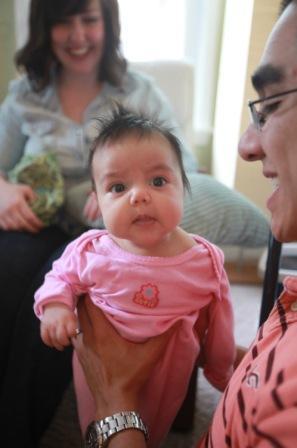
A British study showed three-month-old babies recognize human voices and can distinguish emotions from the sound, the Daily Mail reported.
The research from the Institute of Psychiatry at King’s College London tested 21 infants, aged between three months and seven months, by monitoring brain activity through an MRI scan after playing recorded noises made by machines, human sounds and squeaking of toys.
Human sounds and squeaking of toys triggered different brain activity, as the brain area linked to speech reacted to human sounds.
Babies also reacted to different emotions. The brain area in charge of emotions was better stimulated by crying than laughter or neutral sounds.
According to the researchers, “It was rare to see such specialized brain regions so early in life. It is probably because the human voice is such an important social cue that the brain shows an early specialization for its processing.”
The study provided important clues to understanding the origin of communication and language along with insights into autism, they added.
Past studies have shown that newborns prefer their mother tongue and mother’s voice.
A study in Germany revealed that the cries of five-day-old babies differ by the country and area in which they were born. An infant born in Newcastle, England, cries differently from a baby born in Hamburg, Germany.
The researchers suggested that babies overhear their parents’ conversations and learn certain patterns while in the womb.
By Jung Eun-jung
(kristin2j@gmail.com)
Intern reporter
<관련 한글 기사>
英연구진 “아기 3개월이면 사람말 구별한다”
MRI 뇌스캔 통해 입증…“언어습득 기원 규명에 단서”
아기가 생후 3개월만 지나면 사람의 음성을 구별하고 말에 담긴 감정을 느낀다는 연구 결과가 나왔다.
부모들이 갓난아기 주변에서 전화 통화를 할 때도 될 수 있으면 ‘고운 말’을 쓰도록 조심해야 한다는 뜻이다.
1일 영국 데일리 메일에 따르면 현지 명문대 ‘킹스 칼리지 런던(KCL)’ 신경정신과센터의 연구진은 3∼7개월 된 아기 21명에게 사람의 음성과 기계소음, 물소리 등을 들려주며 뇌 활동을 자기공명영상(MRI) 스캐너로 검사했다.
아기들은 사람의 목소리와 장난감 소리에 다른 반응을 보였다. 말하기를 관장하는 것으로 알려진 뇌 부위가 집안 소음보다 사람의 목소리에 훨씬 더 활발하게 반응한 것이다.
목소리에 담긴 감정에도 아이들은 민감했다. 감정과 연관된 뇌 부위는 웃음소리나 담담한 목소리보다 울음소리에 더 격렬하게 움직였다.
연구진은 “뇌의 특정 부위가 이처럼 어린 시기에 활성화된다는 사실을 발견한 것은 드문 일”이라며 “사람의 목소리가 중요한 사회적 신호(cue)이기 때문에 이런 결과가 나온 것 같다”고 설명했다.
이 실험은 의사소통과 언어습득의 기원을 이해하는 데 중요한 단서를 제공하고 유아 자폐증 등의 질환의 치료법 개발에도 도움을 줄 것이라고 연구진은 전했다.
연구결과를 담은 논문은 학술지인 ‘커런트 바이올로지(Current Biology)’에 실렸다.
갓난아기들이 언어에 무감하지 않다는 연구결과는 예전에도 많았다. 아기들은 어머니의 목소리와 자기 모국어를 듣는 것을 더 좋아하는 것으로 알려졌다.
독일 연구진은 생후 3∼5일에 불과한 아기들이 각자 출생 국가와 지역에 따라 다른 방식으로 운다는 사실을 발견하기도 했다.
예컨대 영국 뉴캐슬에서 태어난 아기는 독일 함부르크에서 난 아이와는 울음의 파형 구조가 확연히 다르다는 것이다.
연구진은 아기들이 자궁에 있을 때 부모의 대화를 ‘엿듣고’ 자연스럽게 현지 언어와 연관성이 있는 울음을 익힌다고 추정했다.
(연합뉴스)
英연구진 “아기 3개월이면 사람말 구별한다”
MRI 뇌스캔 통해 입증…“언어습득 기원 규명에 단서”
아기가 생후 3개월만 지나면 사람의 음성을 구별하고 말에 담긴 감정을 느낀다는 연구 결과가 나왔다.
부모들이 갓난아기 주변에서 전화 통화를 할 때도 될 수 있으면 ‘고운 말’을 쓰도록 조심해야 한다는 뜻이다.
1일 영국 데일리 메일에 따르면 현지 명문대 ‘킹스 칼리지 런던(KCL)’ 신경정신과센터의 연구진은 3∼7개월 된 아기 21명에게 사람의 음성과 기계소음, 물소리 등을 들려주며 뇌 활동을 자기공명영상(MRI) 스캐너로 검사했다.
아기들은 사람의 목소리와 장난감 소리에 다른 반응을 보였다. 말하기를 관장하는 것으로 알려진 뇌 부위가 집안 소음보다 사람의 목소리에 훨씬 더 활발하게 반응한 것이다.
목소리에 담긴 감정에도 아이들은 민감했다. 감정과 연관된 뇌 부위는 웃음소리나 담담한 목소리보다 울음소리에 더 격렬하게 움직였다.
연구진은 “뇌의 특정 부위가 이처럼 어린 시기에 활성화된다는 사실을 발견한 것은 드문 일”이라며 “사람의 목소리가 중요한 사회적 신호(cue)이기 때문에 이런 결과가 나온 것 같다”고 설명했다.
이 실험은 의사소통과 언어습득의 기원을 이해하는 데 중요한 단서를 제공하고 유아 자폐증 등의 질환의 치료법 개발에도 도움을 줄 것이라고 연구진은 전했다.
연구결과를 담은 논문은 학술지인 ‘커런트 바이올로지(Current Biology)’에 실렸다.
갓난아기들이 언어에 무감하지 않다는 연구결과는 예전에도 많았다. 아기들은 어머니의 목소리와 자기 모국어를 듣는 것을 더 좋아하는 것으로 알려졌다.
독일 연구진은 생후 3∼5일에 불과한 아기들이 각자 출생 국가와 지역에 따라 다른 방식으로 운다는 사실을 발견하기도 했다.
예컨대 영국 뉴캐슬에서 태어난 아기는 독일 함부르크에서 난 아이와는 울음의 파형 구조가 확연히 다르다는 것이다.
연구진은 아기들이 자궁에 있을 때 부모의 대화를 ‘엿듣고’ 자연스럽게 현지 언어와 연관성이 있는 울음을 익힌다고 추정했다.
(연합뉴스)





![[Graphic News] Beer the most favored alcoholic drink by Koreans](http://res.heraldm.com/phpwas/restmb_idxmake.php?idx=644&simg=/content/image/2024/05/09/20240509050765_0.gif&u=)







![[Weekender] Pet food makers bet big on ‘recession-free’ pet food market](http://res.heraldm.com/phpwas/restmb_idxmake.php?idx=652&simg=/content/image/2024/05/10/20240510050754_0.jpg&u=20240511163252)




![[What to play] Musical tributes to family in the month of family](http://res.heraldm.com/phpwas/restmb_idxmake.php?idx=642&simg=/content/image/2024/05/09/20240509050795_0.jpg&u=)